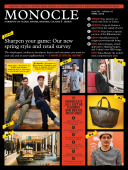
Issue 62
Sharpen your game: Our new spring style and retail survey.
The shopkeepers, architects, developers, buyers and consumers you want on your side and in your neighbourhood – a Monocle special report.
In This Issue
Oops! No content was found.
Looks like we no longer have content for the page you're on. Perhaps try a search?
Return Home

